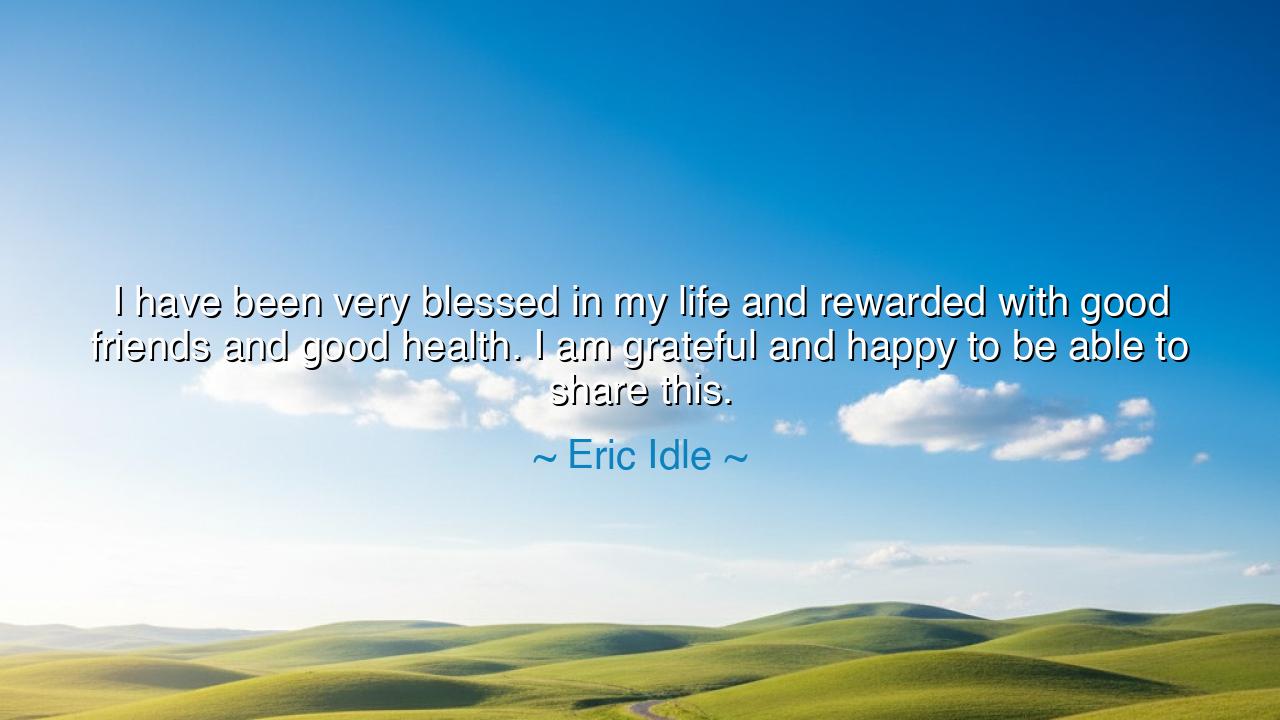
I have been very blessed in my life and rewarded with good
I have been very blessed in my life and rewarded with good friends and good health. I am grateful and happy to be able to share this.






“I have been very blessed in my life and rewarded with good friends and good health. I am grateful and happy to be able to share this.” — thus spoke Eric Idle, the poet of laughter and song, whose wit has brightened the weary hearts of many. In this gentle and humble confession lies not the boast of fortune, but the wisdom of gratitude — a recognition that joy, when kept to oneself, fades like an echo in an empty hall, but when shared, multiplies like sunlight upon the sea. His words remind us that friendship and health are treasures greater than gold, and that the true art of living is to rejoice in them not as possessions, but as gifts entrusted to the spirit.
The meaning of Idle’s words runs deep, for he speaks as one who has seen both triumph and toil. Born into a world still scarred by war, he rose from humble beginnings to become a voice of mirth and meaning through his art. Yet even amid laughter, he never forgot the solemn truth that life’s blessings are fragile, fleeting as the wind that carries a melody. By naming his friends and health as his greatest rewards, he lifts our eyes away from the glitter of fame and toward the true jewels of existence — companionship and vitality. These are the riches that no thief may steal, the kind that time itself cannot tarnish when they are cherished with humility.
In ancient times, the philosophers of both East and West spoke of this same truth. The Stoic Seneca wrote that “gratitude is not only the greatest of virtues, but the parent of all others.” And in the East, the sages of India taught that he who gives thanks opens the door to peace, for gratitude transforms what we have into abundance. Idle, in his simplicity, speaks this same eternal wisdom: that to be grateful is not to deny struggle, but to see through it — to recognize that life’s goodness persists even in the shadow of pain. Gratitude, then, is not a reaction but a way of seeing; it is the vision of the wise.
Consider the story of Helen Keller, who, though born without sight or sound, lived a life of radiant joy. She, too, counted herself blessed, not for what she lacked, but for the friendships and love that filled her heart. Her teacher, Anne Sullivan, was her guide and her friend, and through that bond Keller discovered not despair, but beauty — the beauty of connection, of shared triumphs, of human touch. Like Eric Idle, she understood that to share one’s blessings — to turn one’s joy outward — is to magnify it a hundredfold. The lonely soul hoards happiness and loses it; the generous soul gives it away and is forever filled.
When Idle says he is “happy to be able to share this,” his words echo the great truth that happiness grows through generosity. The act of sharing — whether laughter, wisdom, or kindness — transforms personal fortune into communal joy. The ancients would call this the “circle of life’s blessings”: the more one gives, the more one receives. A smile given to a stranger returns as warmth in the heart; a word of comfort spoken to the sorrowful becomes a light that guides one’s own path. Thus, sharing is not loss, but the deepest form of abundance — the overflowing cup that blesses both giver and receiver alike.
The health that Idle praises is not only the strength of the body, but the harmony of the spirit. To be well in body is a gift of nature; to be well in soul is a gift of wisdom. And both are sustained by the presence of good friends, for human hearts are not made to live in isolation. The laughter of companions, the counsel of allies, the quiet presence of those who understand — these are medicines more powerful than any herb or elixir. The wise of every age have known that the greatest cure for sorrow is fellowship, and that even the sickly can feel whole when surrounded by love.
The lesson, then, is one of remembrance and renewal. Be grateful for your friends, for they are the family you choose; guard your health, for it is the foundation upon which joy is built. Above all, learn to share — your time, your laughter, your kindness, your blessings. Speak words of thanks each morning, not as ritual but as truth, for gratitude awakens the heart and cleanses it of bitterness. And when you are tempted to count what you lack, look instead upon what you have been given, and offer it freely to others. For in that offering, you will find that you possess more than you ever knew.
So, my children of the modern age, remember the wisdom of Eric Idle: to be blessed is not merely to have, but to know that you have; to be grateful is not merely to feel, but to act in gratitude. Let your joy become light for others. Cherish your health as the vessel of your purpose, and your friends as the guardians of your heart. For in the end, the richest life is not the one filled with possessions, but the one that says with peace and sincerity — I have been blessed, and I am grateful to share it.






AAdministratorAdministrator
Welcome, honored guests. Please leave a comment, we will respond soon